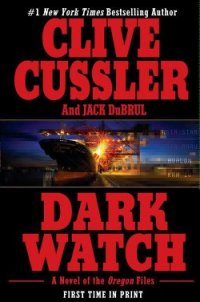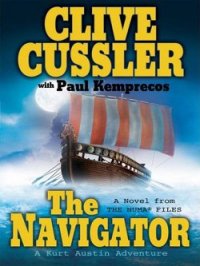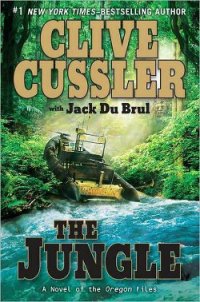Night Probe! - Cussler Clive (онлайн книги бесплатно полные txt) 📗
"All in the line of duty," she said sarcastically. "Bedding down a woman to extract information and then using it to murder twelve innocent men. In my book, Mr. Shaw, you stink."
He was silent for a moment. American women, he mused, have an entirely different way of expressing themselves from that of British women. "A regrettable and completely senseless tragedy," he said. "I want you, and especially Dirk Pitt, to know I was not responsible for what happened."
"You've lied before. Why break your streak?"
"Pitt will believe me when you tell him it was Foss Gly who set off the explosives."
"Foss Gly?"
"Pitt knows the name."
She looked at him skeptically. "You could have stated your case with a phone call. Why are you really here? To pump more information out of me? To learn if we recovered the treaty copy from the Empress of Ireland?"
"You did not find the treaty," he said with finality. "You're shooting in the dark."
"I know that Pitt left Washington for New York and the search on the Hudson River still goes on. That's proof enough."
"You haven't told me what you want," she persisted.
He looked at her, his eyes intent. "You're to deliver a message from my prime minister to your president."
She glared back at him. "You're crazy."
"Not the least. On the face of it, Her Majesty's government is not supposed to be aware of what yours is about and it's too early in the game for a direct confrontation. Because the situation is too delicate for two friendly nations to go through ordinary diplomatic channels, all communications must be handled in a roundabout fashion. It's not an uncommon practice; in fact, the Russians are particularly fond of it."
"But I can't just call up the President," she said, bewildered.
"No need. Just relay the message to Alan Mercier. He'll take it from there."
"The national security adviser?"
Shaw nodded. "The same."
Heidi looked lost. "What do I tell him?"
"You're simply to say that Britain will not give up one of its Commonwealth nations because of a scrap of paper. And we will conduct a strong military defense against any incursion from outside the nation's borders."
"Are you suggesting a showdown between America and…..."
"You'd win, of course, but it would be the end of the Atlantic Alliance and NATO. The Prime Minister is hoping your country won't pay that high a price to take over Canada."
"Take over Canada," she repeated. "That's ridiculous."
"Is it? Why else are your people pulling out all stops to find a treaty copy?"
"There must be other reasons."
"Perhaps." He hesitated as he took her hand in his. "But somehow I don't think so."
"So the train lies buried under the fallen bridge," said Pitt. Glen Chase nodded. "Everything points in that direction."
"The only place it could be," added Giordino.
Pitt leaned over the railing of the catwalk that hung across the beam of the salvage barge. He watched the long projecting arm of the crane arc around and release a dripping mass of rusting girders into the main hold. Then it swung back and dipped its claw back into the river.
"At this rate it will take a week before we can probe the bottom."
"We can't excavate until the debris is out of the way," said Giordino.
Pitt turned to Chase. "Have one of your men remove a few fragments from the original truss connections with a cutting torch. I'd like to run them by an analytical chemistry lab."
"What do you expect to find?" Chase asked.
"Maybe why the bridge failed," Pitt replied.
A man with a hard hat held up a portable loudspeaker and shouted over the noise of the crane's diesel engine: "Mr. Pitt, you're wanted on the phone."
Pitt excused himself and entered the barge's command office. The call was from Moon. "Any news?"
"None," Pitt answered.
There was a pause. "The President must have the treaty copy by Monday." Pitt was stunned. "That's only five days away."
"If you come up empty-handed by one o'clock in the afternoon on Monday, all search activities will be canceled."
Pitt's lips pressed together. "Dammit, Moon! You can't set impossible deadlines on a project like this."
"I'm sorry, that's the way it is."
"Why such short notice?"
"I can only tell you that the urgency is critical."
The knuckles of Pitt's hand clenched around the receiver turned ivory. He could think of nothing to say. "Are you still there?" queried Moon.
"Yes, I'm here."
"The President is anxious to hear of your progress."
"What progress?"
"You'll have to do better than that," Moon said testily.
"Everything hangs on whether we come across the train and the coach Essex was riding in."
"Care to give me an estimate?"
"There's an old saying among archaeologists," said Pitt. "Nothing is found until it wants to be found."
"I'm sure the President would prefer a more optimistic report. What should I tell him the chances are of having the treaty in his hands by Monday?"
"Tell the President," said Pitt, his voice like ice, "he doesn't have a prayer."
Pitt reached the Heiser Foundation analytic labs in Brooklyn at midnight. He backed the pickup truck against a loading dock and switched off the ignition. Dr. Walter McComb, the chief chemist, and two of his assistants were there, waiting for him. Pitt said, "I appreciate your staying up so late."
McComb, fifteen years older than Pitt and about seventy pounds heavier, hoisted one of the heavy bridge fragments without a grunt and shrugged. "I've never had a request from the White House before. How could I refuse?"
The four of them manhandled the steel scrap into a corner of a small warehouse. There the lab people used electric saws with moly steel blades to cut off samples which were soaked in a solution and cleaned by acoustics. Then they filtered away to different laboratories to begin their respective analytic specialities.
It was four in the morning when McComb conferred with his assistants and approached Pitt in the employees' lounge. "I.think we have something interesting for you," he said, grinning.
"How interesting?" Pitt asked.
"We've solved the mystery behind the Deauville-Hudson bridge collapse." McComb motioned for Pitt to follow him into a room crammed with exotic-looking chemistry equipment. He handed Pitt a large magnifying glass and pointed at two objects on the table. "See for yourself."
Pitt did as he was told and looked up questioningly. "What am I looking for?"
"Metal that separates under heavy stress leaves fracture lines. They're obvious in the sample on the left."
Pitt looked again. "Okay, I see them."
"You'll note that there are no fracture lines on the sample from the bridge to your right. The deformation is too extreme to have come from natural causes. We put specimens of it under a scanning electron microscope, which shows us the characteristic electrons in each element present. The results revealed residue from iron sulfide."
"What does it all mean?"
"What it all means, Mr. Pitt, is that the Deauville-Hudson bridge was cleverly. and systematically blown up."




